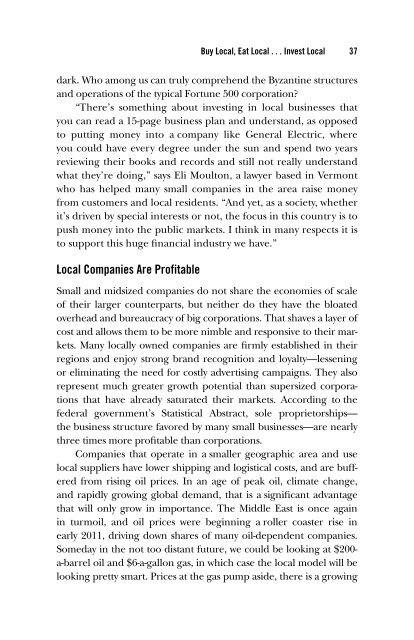3c hapter - Index of
3c hapter - Index of
3c hapter - Index of
Create successful ePaper yourself
Turn your PDF publications into a flip-book with our unique Google optimized e-Paper software.
Buy Local, Eat Local . . . Invest Local 37<br />
dark. Who among us can truly comprehend the Byzantine structures<br />
and operations <strong>of</strong> the typical Fortune 500 corporation?<br />
“There’s something about investing in local businesses that<br />
you can read a 15-page business plan and understand, as opposed<br />
to putting money into a company like General Electric, where<br />
you could have every degree under the sun and spend two years<br />
reviewing their books and records and still not really understand<br />
what they’re doing,” says Eli Moulton, a lawyer based in Vermont<br />
who has helped many small companies in the area raise money<br />
from customers and local residents. “And yet, as a society, whether<br />
it’s driven by special interests or not, the focus in this country is to<br />
push money into the public markets. I think in many respects it is<br />
to support this huge fi nancial industry we have.”<br />
Local Companies Are Pr<strong>of</strong>itable<br />
Small and midsized companies do not share the economies <strong>of</strong> scale<br />
<strong>of</strong> their larger counterparts, but neither do they have the bloated<br />
overhead and bureaucracy <strong>of</strong> big corporations. That shaves a layer <strong>of</strong><br />
cost and allows them to be more nimble and responsive to their markets.<br />
Many locally owned companies are fi rmly established in their<br />
regions and enjoy strong brand recognition and loyalty— lessening<br />
or eliminating the need for costly advertising campaigns. They also<br />
represent much greater growth potential than supersized corporations<br />
that have already saturated their markets. According to the<br />
federal government’s Statistical Abstract, sole proprietorships —<br />
the business structure favored by many small businesses —are nearly<br />
three times more pr<strong>of</strong>i table than corporations.<br />
Companies that operate in a smaller geographic area and use<br />
local suppliers have lower shipping and logistical costs, and are buffered<br />
from rising oil prices. In an age <strong>of</strong> peak oil, climate change,<br />
and rapidly growing global demand, that is a signifi cant advantage<br />
that will only grow in importance. The Middle East is once again<br />
in turmoil, and oil prices were beginning a roller coaster rise in<br />
early 2011, driving down shares <strong>of</strong> many oil- dependent companies.<br />
Someday in the not too distant future, we could be looking at $200a-<br />
barrel oil and $6- a- gallon gas, in which case the local model will be<br />
looking pretty smart. Prices at the gas pump aside, there is a growing
















